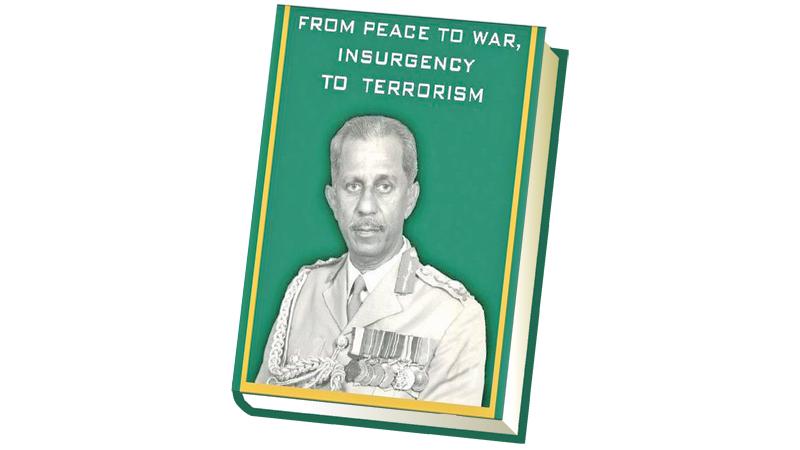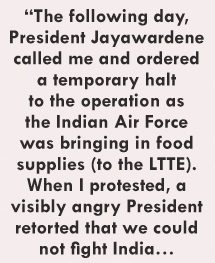
Title – Adventurous Journey: From Peace to War, Insurgency to Terrorism
Author – Gen. (Rtd) Cyril Ranatunga
Publisher – Vijitha Yapa
Former Defence Secretary and Army Chief of Staff, General Cyril Ranatunga (Retd) passed away last 16th of this month at the age of 91. However, in his lifetime he wrote only one book an autobiography titled Adventurous Journey: From Peace to War, Insurgency to Terrorism. The book was released just two months after the defeat of the LTTE in 2009. Most probably, it wouldn’t have been written to celebrate the LTTE’s defeat and he may have begun to write the book long before 2009.
Who is Cyril Ranatunga?
If you were born in ‘70s or early ‘80s, you may not have heard the name Cyril Ranatunaga. He was the General Officer Commanding at the Joint Operations Command which launched the famous Vadamarachchi Operation in 1987. As he has said, Sri Lanka would have celebrated victory over the LTTE 22 years before 2009, had India not intervened in our military operations in the North, for the Sri Lanka army was on the verge of the victory. However, this autobiography reveals all the hidden stories behind the Indian intervention, the JVP insurrection in 1971 which Gen. Ranatunga helped to contain.
Significance of the book
 Though the book has 21 paragraphs and 220 pages, it mainly covers three aspects. One is his personal life, second - Sri Lanka’s military history which he had been a part of, and the third is his endeavours in the diplomatic service where he served as a High Commissioner to Australia, United Kingdom, New Zealand and Papua New Guinea.
Though the book has 21 paragraphs and 220 pages, it mainly covers three aspects. One is his personal life, second - Sri Lanka’s military history which he had been a part of, and the third is his endeavours in the diplomatic service where he served as a High Commissioner to Australia, United Kingdom, New Zealand and Papua New Guinea.
This is the first ever autobiography written by a top military officer in Sri Lanka. It is an Adventurous Journey as the title goes, though it’s an adventurous journey of the whole country with regard to national security.
Early life
The book starts with his early life:
“I was born on 19 February 1930 to a family of six children: three brothers and two sisters. My brothers and I were all educated at St. Sylvester’s College, one of the leading schools in the district and right in the heart of the historic town of Kandy.
We were born in the village of Bakmeedeniya, near Kegalle where my father was living at the time. My elder brother George, who is no longer living, retired as a colonel from the army.
The other brothers Bertie and Chandra are also professionals; one a licensed surveyor and the other practicing law in the Kegalle Bar respectively. Chandra was also Deputy Minister of Housing and Construction under President Ranasinghe Premadasa (1990 - 1994). One of my sisters lives in the land adjoining mine in Mawanella, while the other lives in Colombo.” (Page 1)
In the inaugurating chapter he describes his school days too. In fact, he was the captain of the College hockey and athletic teams when he was studying for the Senior School Certificate exam.
All these early performances earned him to become the Head Prefect of the school and the Gold Medalist for All Round Student in 1949. However, all the facts about his life in this book, one way or another, conform to the main topic which is the story of his military life. And the book was written with a simple language and an easy style which enables the reader to enter the experiences in it without confronting others.
Insurrection in 1971
One of the interesting chapters of the book is Insurrection 1971 which uncovers the events behind the JVP’s insurrection in 1971. As he reminisces, the whole situation was very dangerous when he embarked on a mission to contain the JVP insurgency which started in the wee hours of April 5 in 1971.
At that time he was a Lt. Colonel and Commanding Officer of the 1st Recce Regiment. But he was appointed the Military Coordinating Officer of the Kegalle district by the Prime Minister for this mission, where he effectively subdued the insurgency in the district which had been overrun by insurgents.
“…. The youth involved in the insurrection were largely from the majority Sinhalese community. The estimates of youth affected range from 30-60,000 killed or missing with thousands injured. Of those killed, many could be considered ‘innocent’ of major crimes. The damage to life, property and the misery which followed can never be estimated in rupees.” (Pages 57 - 58)
However, the youth who engaged in the violent attacks were not well-trained according to General Ranatunga. Therefore, he says, “In many instances they tied explosives in the centre of the bridge (to blast it) rather than at the two ends which is the more effective way. However, hand bomb making had become a cottage industry in the areas of Pindeniya, Dedigama and Morontota….” (Pages 58)
Vadamarachchi operation
The most intriguing chapter of the book is Vadamarachchi: Operation Liberation – which htook place in 1987. At that time Gen. Cyril Ranatunga was the Defence Secretary, and the Minister of National Security was Lalith Athulathmudali. Top military officers such as Brig. Denzil Kobbekaduwa, Brig. Vijaya Wimalarathne, Col. Lionel Balagalle and Lt. Col. Sunil Tennakoon participated in that operation, and Gotabaya Rajapaksa (now President) and Sarath Fonseka (now a Field Marshal and a MP) also took part in it. However, when the LTTE were cornered by the Sri Lanka Army in Vadamarachchi, then the President J.R. Jayawardene received orders from India to call off the troops. General Ranatunga recalls India’s forced interference with great disappointment:
“The following day, President Jayawardene called me and ordered a temporary halt to the operation as the Indian Air Force was bringing in food supplies (to the LTTE). When I protested, a visibly angry President retorted that we could not fight India…..
“International leaders and so-called superpowers chose to ignore this blatant interference, which I call hypocrisy. A nation like ours was too small to benefit the bigger players in the world to get involved irrespective of human duty. I was thoroughly dejected and wondered how I could give instructions to stop the offensive, which was nearing completion.
The troops on the ground who were ready to sacrifice their lives to liberate our country from the terrorist menace would react in different ways.
The instructions I received gave me approximately two hours to bring the offensive to a halt. I had to visit the troops on the battlefield and break the news. For the first time, I saw the disappointment on their faces. Some found it difficult to accept and even questioned their company commanders how India could do such things.
“Finally, Operation Liberation was called off.” (Pages 141–142)
Betrayal
In the chapter President Premadasa, General Ranatungae elaborates details that happened after President R. Premadasa took office. We know that Mr. Premadasa sent back the Indian Peace Keeping Force (IPKF) to India.
But according to General Ranatunga, it is not a prudent decision to send them back: “The IPKF, had they remained, would somehow have managed to complete their mission of destroying the LTTE terrorism; the very terrorists they themselves had trained not too long ago.” (Page 160)
Then he describes how he was shocked to learn that President Premadasa had decided to give arms to the LTTE. When he went to meet President Premadasa to discuss the matter, to Sucharitha where Premadasa worked. Premadasa only said to him as follows: “I will sort it out. They have assured me they will never fight us with these weapons. I am giving them these arms to fight the TNA (Tamil National Army) which the IPKF is creating.” (Page 164)
However, when General Ranatunge was returning from the Sucharitha, he felt great sad:
“I was crying as I left. Should I send in my resignation?” (Page 164)
But, he never sent in his resignation. Instead he accepted more responsibilities from President Premadasa, especially in the diplomatic service and served in many Western countries. This makes the reader wonder whether Gen. Ranatunga should have admitted his guilt as he was the Defence Secretary then. But instead of a confession, the book is a celebration of his gains.
